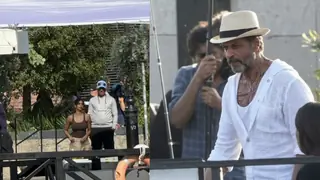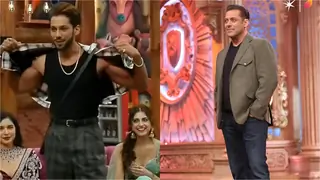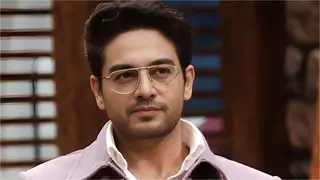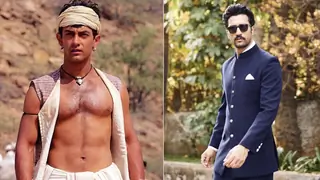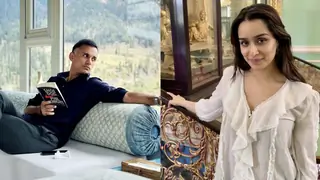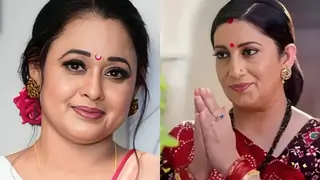| Ustad Baba Allauddin Khan and Smt. Annapurna Devi
"Annapoorna Devi -- The Woman Shrouded in a Mystery"
*Some have heard of her. Few have met her. None truly know her. Ali Akbar Khan says she is 'simply great'. Ravi Shankar acknowledges her genius. Yet, none have heard her play. Mysterious, intriguing, she is like our own Garbo, living in her own shadows, shutting herself out from the world in the cloistered confines of a city flat, seeking peace in an instrument her father taught her. She wants nothing from the world, from society. But if she decided to give of herself, the world would 6e a richer place.* Six floors up the elevator in a high-rise building, in one of the posh residential localities of Bombay, lives a woman. That is by far the only information one can get from the residents of the building and the elevator operator. No one sees her, not even her immediate neighbour. The board at the entrance of the building simply spells: 6 A-Annapoorna Devi. With some trepidation one mumbles the floor number to the elevator operator. A square board is tacked next to her door-bell. It reads: 1 ) The door will not be opened on Mondays and Fridays. 2) Please ring the bell only thrice. 3) lf no one opens the door please leave your name and address. Thank you very much. Inconvenience is regretted. Standing there one wonders whether to believe the instructions or not. However, courage is a helpful commodity.You press the bell-button thrice and await a response. Nothing happens. Not a sound from inside. As the Americans would say 'it's kinda scary' but another attempt is futile, the first one tells you. As one leaves the building, taking in a lungful of the cool sea breeze, questions like a swarm of bees rush clouding all other thoughts. How can a woman stay in the claustrophobic confines of a flat so absolutely cut off from the rest of the world? Three sixty five days of the year? ls it voluntary or is it an imposition of another's ill,binding her to a forced anonymity? Is she happy? What does she do? And finally, who is she? Annapoorna Devi is related to two of the best known exponents of Indian instrumental music in the world Pandit Ravi Shankar and Ustad Ali Akbar Khan. The later is her brother and the former her ex-husband. What's more, she is the daughter of the legendary Ustad Allaudin Khan, the sarod wizard. While Pandit Ravi Shankar and Ustad Ali Akbar Khan have made a name for themselves, she remains the genius behind the curtain. one whose genius is acknowledged by all to the extent that some of her fans openly claim she's more talented than Ravi Shankar himself. No matter which school of music they belong to, none dispute the fact that Annapooma Devi is a musician par excellence, not to be grouped with the rest. If this is so, what does one make of the reclusive life style that this lady leads? What does one say of an artiste who has given barely ten or eleven public performances in all her life? What is the touchstone of her talent? Why has all that talent been cloistered? What are the deep mysteries that enveloped her making her disappear from the limelight so completely? And what was she as a woman who loved and lost, or may be not. Of the many who regard as the very incarnation of Saraswati, only handful have met her, leave alone listened to her play. After numerous attempts over a period of six months, we failed to meet with her. Many spoke of her eccentric behaviour, her famous temper; of how she had not allowed even a top photographer of a newsmagazine to take her picture after much persuasive pleading; of how she spurned a lucrative offer from the Madhya Pradesh government which promised her a lakh plus perks per year; of how she turned down leading musicians when they approached her for training; of how she would refuse to meet people, regardless of his/her status or talent; of how Indira Gandhi had to request her to play for Yehudi Menuhin and George Harrison.... the list is legion. Perhaps that's when the determination lo know her, or at least of her, grew stronger. The prospects of meeting her however remained as bleak as ever. In Maihar, fifty seven or fifty eight years ago, she was born the daughter of Ustad Allaudin Khan. An orthodox Muslim father, Allaudin Khan decided to teach only his male progeny, Ali Akbar Khan, the magic of sarod. One day while the maestro was out, Ali Akbar could not get a particular note right and Annapoorna who had been imbibing lessons from behind the closed door stepped in and started pointing out the intricacies of the piece by singing it. Her father who entered at that moment was stupefied at the god-given talent of his daughter. Allaudin Khan motioned to her to follow him to his room upstairs where he handed her a tanpura and asked her to sing. While the young girl sang, the father wept tears of joy and welcome disbelief. Her training began. Being well-acquainted with the shy and introverted nature of his daughter, he decided to teach her to play the strains of a dying instrument, the surbahar(a bigger version of sitar). Soon, Ravi Shankar, who was pursuing dance in the footsteps of his elder brother, the world-famous Uday Shankar, also decided to learn sitar from Ustad Allaudin Khan and gave up dancing. The trio of Annapoorna, Ravi Shankar and Ali Akbar Khan, began a long and arduous journey, trying to plumb the depths of a five thousand year old tradition and culture. Baba (as Allaudin Khan was called by his disciples) was a very strict man and his temper was well-known. There were times when the boys were so petrified that they dared not approach Baba and the only person who had access to him was Annapoorna. He taught her, and she in turn often taught the boys. As the training progressed the interaction between the three also increased. There came a time when Annapoorna and Ravi Shankar were increasingly thrown together. "I had gone to Maihar to study music, there was no question of getting married", says Ravi Shankar in his autobiography, Raag Anuraag. "From 1938 to 1941 my education continued.... I got married after three years of my stay... My sisterin- law had come to visit me at Maihar.... She would come to me and say, 'What a sweet girl is Annapoorna. You must get just such a bride!' on her telling even Alibhai seconded the proposal. Finally it reached my father's ear.... I was only watching the fun all those days. What was my age then? Twenty, twenty one, what else?When the proposal to marry Annapoorna was put forth I really did not think about its seriousness. At that time I was obessessed with music. And Baba's love and his loving way of teaching me. I never got any affection from my father all my life... so the love I was getting from Allaudin Khan overwhelmed me.. I was filled with gratitude. So when there was talk of marrying his daughter I was not in a state to think reasonably about it. I felt the marriage inevitable... the marriage took place." With Ravi Shankar by her side, Annapoorna gave some recitals, each surpassing the other in exhibiting the subtleties and intricacies of classical music. Soon, a son was born to them, Shubhendra, and a little while later things began happening. Going by Pt. Ravi Shankar's autobiography one can understand that the couple were probably destined to drift apart, as he himself writes....' I was not in a state to think reasonably:. Perhaps the moment reason set in, love frayed at the edges, leading to the final break. Surprisingly, Ravi Shankar does not blame her for it "but the chemistry of love did not work finally. Because there is a need to compromise in the maturity of love. Just sentiment and emotion cannot live for ever. At one stage there will be need to compromise and we couldn't do that.....After Shubho's birth Annapoorna's health also deteriorated...Usually I have nothing besides praise for Annapoorna. She is so gifted! But she has a tremendous temper. Like her father. That is to say, she has less patience than others. And at that time even I was very ill-tempered. So we both would flare up together. Then we came to Bombay towards the end of '44. I was recovering from my illness at that time. And then I fell in love with somebody else.. Kamala. Perhaps the affair became too big, mainly from my side. Annapoorna was definitely hurt by the entire affair. But my relation with Kamala was really nothing much. Anyway, I was mainly responsible for this crack.. Annapoorna felt hurt and went away to Maihar." This and her father's subsequent death dealt a severe blow to Annapoorna, something that she could never recover from. Nature had unleashed that strange, savage streak of vengeance on the most undeserving. Pandit Hari Prasad Chaurasia, the renowned flautist and one of her most famous disciples, says. "The point we fail to understand is that she is no ordinarywoman. How could she, after her break with Panditji ( Ravi Shankar) feel confident of facing the world? After all she was Allaudin Khan's daughter and Ali Akbar Khan's sister and a genius in her own right. How could she open up with everyone? What could she have talked about? Her family life? Her music which was inextricably woven with her family ties? I guess she just gave up. A soul regardless of the body." She became a recluse. She was not interested in the material world to which she had never belonged anyway. Her son went abroad, married an American and made that country the land of his dreams. She yearned for him, for the artiste in him, but the son chose the other way,the way of the world. She even refused to accept disciples and those who came to her were often turned away, discouraged from learning. Some of the disciples we spoke to described their experiences with 'maaji' with remarkable likeness. The common thread that runs through each person's description of his meeting with Annapoorna Devi is her reluctance to accept him, her strict attitude and endless patience. "I always had a great desire to learn from her since 1974" says Nityanand Haldipur, a flautist with AIR who's just begun learning from Annapoorna Devi about four months back. "But things never worked out and I always missed a chance to meet her. Finally, one day, my friend, a sarod player, Rajiv Taranath, took me to her house. I was literally trembling with fear as I was overawed by what I had heard of her, that she is very strict, stern and possesses a fiery temper. Let alone approaching her to teach me, I could not even bring myself to talk to her. Anyway, we all sat together talking and I was trying to camouflage my intentions by referring to Taranath's plans. I guess we veered towards talking of students and the lack of patience that is obvious in them when I hesitantly broached the subject of my training. Surprisingly she agreed and asked me to play one of the basic ragas, Yaman. After listening to me she pointed out certain flaws in my rendition and I was stunned. She was absolutely right! Till that day I had considered myself as an artiste of some calibre and was hopeful that I would be able to make a mark in a couple of years. But now, I thought, I was just a beginner. "I used to think, before I met her, given my doubting nature, that she is regarded as great only because she happens to be Ustad Allaudin Khan's daughter. But, believe me, when I met her and listened to one of her recordings (very rare, of course) my god, I couldn't believe it. I realised that a lot of artistes who prefix their names with Pt. (implying Pandit) are only points, zeroes. She is incomparable. Besides being an unmatched artiste she is also a fantastic human being. Very strict and stern outside but soft within. I remember an interesting incident. once, a Nepali boy who was learning from her, visited her after a couple of months only to tell her that he wanted to learn the violin instead of the instrument he earlier played. She was very angry, I remember, but she soon cooled down and asked me to search for a violin teacher for the boy. I told her, 'But maaji, the teacher will expect monthly fees.' To which she replied, 'Get the teacher and I'll pay him.' I don't know why she is such a recluse and shuns performing but of course, I don't have the gutS to ask her. In her presence I am a nobody." Annapoorna Devi's only aim in life is to spread her Baba's (Allaudin Khan's) art as much as she can. The artiste in her seeks fulfilment in the privacy of her room, the audience being the two huge photographs of her father and mother who silently applaud the devotion of their daughter. Is there something that torments her? Something that urges her to live by herself, away from the robotic life of the masses? Chaurasia explains, "I don't know what it is. I only know that she has no will or desire to live. I remember once she was very ill and coughing very violently. So when I went to see her I took some medicines for her. To my shock, she threw the medicines away, 'Why have you brought these for me? What is troubling you if I am coughing? Why do you want me to live when I don't want to?' What could I say to that? She has lost faith in life. It's a tragedy when I think that such a rare human being, such a gifted musician, does not find any meaning in life. My heart bleeds. I am of the view that for every good thing that god gives, he takes away something to keep the balance straight. In her case she is gifted with the complete personality that becomes a true musician but god has also taken away from her the security a woman seeks in her family. I had only heard of jogans (saints). Now I have seen one." To justify her lifestyle as that which many geniuses are prone to lead is not enough. In most cases it is justified by a genuine rationale. Pradeep Kumar, a sarod exponent at the Films Division, and a student of Annapooma Devi relates his experience which throws some more light on her eccentric behaviour, if one may call it that. "ln 1974 I started learning the sarod from her. For five years I tutored under her and she became very fond of me. To such an extent that she even started teaching me Ustad Allaudin Khan's style of playing, the Dhrupad Ang. Around '79 my parents fixed my marriage and at a quiet ceremony I was engaged. I did not tell her this and one day suddenly I told her that my marriage had been fixed. She took it very calmly and told me that it was time I took a break and that she did not feel like teaching me! I was aghast! Why, I asked her. ' It was your duty to tell me about your engagement, wasn t it? A guru is not a simple word, it means more than you imagine it does,' she said sternly. I realised it was entirely my fault. "After this I kept visiting her, pleading with her all the while to take me back but each time she would tell me that she was not in a mood to teach me, 'dil nahi karta hai' (I don't feel like it). >From '79 to '86, seven, yes, seven yes, I kept visiting her from time to time but to no avail. My parents also came to plead with her a couple of times but she wouldn't yield. She never once said she won't teach me, it was always 'I don't feel like.' Then one day, last year, I went to meet her once again and asked her to teach me. She gave me her usual reply. And that was it! I couldn't take it any more and burst out crying. oh, how I wept! I was sitting in the hall and she was in her room. She came out and scolded me, 'kya aurton ki tarah rote ho. Chooriyan pahen lo (why are you weeping like a woman? Go wear bangles). And then she relented 'I never said I'll never teach you, did l? I just kept postponing it. okay get up now. Come tomorrow with some flowers, garlands and a box of sweets we'll begin again. "That's how she is. The way she is with her disciples she will be the same with her son too, if it comes to that. To me she is the ultimate, a maun saadhika (silent saint). But a very hard taskmaster. In all the five years I was with her I learnt only two ragas, Bhairavi and Yaman. Her favourite phrase is: 'you people want everything in a short time.' The only way I have seen her relax is when she feeds the pigeons on her balcony, otherwise it is music." Annapoorna Devi's life in her house revolves around the usual chores -- dusting, cooking, laundry etc. "I've never seen her sitting idle," says Rooshi Kumar Pandya, her only in-residence student and companion for a number of years. "And that's why the need for privacy. Her priorities are different. She wouldn't want her home to become an open house where everyone can walk in and out. Public life is not her way of living, by choice. So that's the way it is. Between her household chores and her students she hardly has any time. Then, there is her own riyaaz (practice) to which she devotes lot of time. I think she is one of the few absolutely absorbed people I have ever met, and she is well-read too. Her other interests include watching films, especially Pakistani plays." Rooshikumar Pandya, whose renewed romance with music (sitar) started way back in the Seventies and gradually metamorphosed into a permanent relationship, came to her in 1974 with a reference from her brother Ali Akbar Khan from whom he was learning music in California. on his summer trips to India he decided to learn from her and in 1982 he took up full-time training in sitar from Annapooma Devi. "She did discourage me too by saying 'Aap lecture-vecture dijiye, yeh aapke bas ka kaam nahin hai. (Go on with your lectures. Music is not your cup of tea). Anyway I had a good reference and she started teaching me. Today when I sit back and think about it I wonder how did she take me under her wing. I mean I've been a teacher but she's the best I have come across myself Her knowledge and mastery over her subject is simply fantastic. once George Harrison had come to listen to her along with Yehudi Menuhin. Menuhin, sadly, could not listen to her but Harrison did" As the sun sets there is relief in the knowledge that tomorrow is another day. And something exciting might happen. For instance she may come out of her flat and smile to her neighbour. She might take a walk down the sea-shore, inhaling deeply of a bracing breeze that had been stemmed in all these years. Perhaps she will allow the world to catch a glimpse of her again, like seeing a gem that had been wrapped away in forgotten corners.Perhaps she will play again, for old times' sake and one last time, telling the world in her incontrovertible moment of triumph, what it had been missing all these years. Yes, perhaps. |














